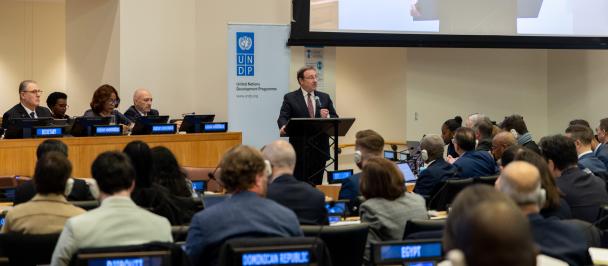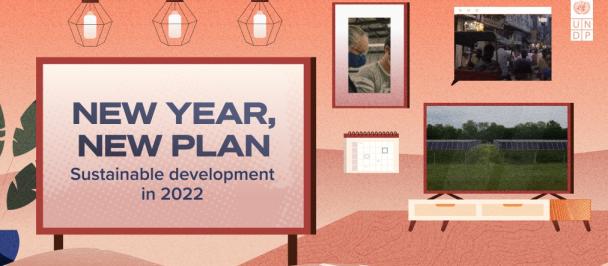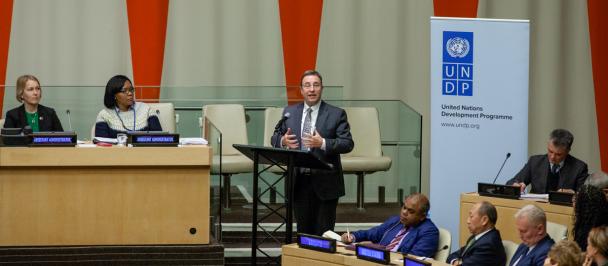Statement at the 99th Meeting of the Development Committee
99th Meeting of the Development Committee
April 13, 2019
As prepared for delivery.
An inclusive and dynamic global economy is essential to achieving the 2030 Agenda for Sustainable Development. Global economic growth is expected to remain steady in 2019 and 2020; however, there are increasing signs that it may have peaked.
Rising downside risks and vulnerabilities also threaten the sustainability of economic growth and the achievement of the Sustainable Development Goals (SDGs). Risks of debt distress have increased, markets are volatile, the trade system is in crisis, wage shares are declining, and carbon emissions have begun to rise again. It is critical to address not only short-term risks but also longer-term sustainable development challenges, including tackling inequalities and climate change.
We still have a global financial and economic system that is not responding to the needs for the scale and type of finance that is required for sustainable development. Decisive policy action is needed to mobilize sufficient finance, including climate finance, and to align incentives with the imperative of advancing sustainable development, including by enabling a shift towards longer-term investment horizons.
In order to give visibility to these challenges and the collective action required to address them, the United Nations will seize the opportunity of a series of high-level events in September, including the SDG Summit, the High-Level Dialogue on Finance and the Climate Action Summit. Coinciding with the General Debate of the 74th session of the UN General Assembly, these high-level meetings will provide an opportunity to take stock of progress made since the historic agreements of 2015, raise the ambition of our collective response and highlight examples of scalable solutions to some of the world’s biggest challenges. The United Nations appreciates its continuing collaboration with the World Bank Group in these areas.
Opportunities for Financing Sustainable Development
Despite growing risks, there is some good news: investment has gained strength in some countries and regions, particularly in East and South Asia, which also have large populations of poor people; income inequality within some developing countries is declining, though levels still remain high; and prices on carbon markets are slowly recovering due to policy changes. There is also growing interest in sustainable and impact investing.
Yet, mobilizing sufficient financing remains a major challenge in implementing the 2030 Agenda. Investments that are critical to SDG achievement remain underfunded. While interest in sustainable financing is growing, the shift towards long-term investment horizons and sustainability is not happening at the required scale nor speed.
The 2019 Financing for Sustainable Development Report, produced by the UN Secretariat in collaboration with the World Bank Group, IMF, WTO, UNCTAD, UNDP and over 50 other agencies of the United Nations system and partner international organizations (the Inter-agency Task Force on Financing for Development), recognizes the scale and urgency of this challenge. The report stresses that financial flows are shaped and incentivized by domestic and international policies and environments. Despite increasing risks, we see opportunity for revisiting national and global approaches to sustainable finance.
Five key messages emerge from our joint analysis:
First, the multilateral system is under strain in a rapidly changing global environment. This is forcing the global community to revisit existing multilateral arrangements. As we address the challenges, we open the door to making multilateral institutions fit for purpose for sustainable development. For example:
• the crisis of the multilateral trading system is also an opportunity to revamp and make it fit for purpose for sustainable development;
• challenges in sovereign debt restructuring, in part due to new instruments and non-traditional creditors, have sensitized the international community to gaps in the existing architecture;
• increasing vulnerabilities have underscored the importance of strengthening the global financial safety net;
• the digitalisation of the economy has fuelled the debate about the design of the international tax system that could help address inequities; and,
• growing market concentration, including in the digital economy, has underscored the need to better monitor this trend and manage its socio-economic implications.
Second, and in response, rather than retreating from multilateralism, the international community must strengthen collective action to address global challenges.
Third, global approaches need to be complemented by national actions. Member States can operationalize integrated national financing frameworks to support national development strategies. These frameworks should respond to the realities of a changing global landscape (for example digitalization and falling wage share).
Fourth, achieving sustainable development and combatting climate change requires a long-term perspective. Yet, both public and private incentives are short-term oriented.
Fifth, we must harness the potential of financial innovations to strengthen development finance. However, such innovations do not eliminate financial and sustainability risks. Policymakers and regulators need to strike a balance between managing emerging risks and enabling experimentation and innovation.
The UN looks forward to working with the World Bank Group and other partners on driving forward the recommendations of this report, which is an important example of our collaboration on financing for sustainable development.
Importance of Tackling Inequalities
Despite the enormous potential of globalization and technological progress, far too many people have not shared the gains and are being left behind. The income of the richest one percent in the world saw twice as much growth as the income of the bottom 50 percent between 1980 and 2016. Income inequality has increased in about half of the countries around the world over the last three decades. Wealth is also becoming more concentrated. Meanwhile global growth in real wages is only 1.8 percent, the lowest since 2008.
Inequalities are prevalent in access to quality education, health, and technologies as well as vulnerability to shocks, among other areas. We also see persistent gender disparities across the world. Inequality limits people’s choices and opportunities and engenders political and social tensions and global inefficiencies. This year UNDP’s flagship Human Development Report will focus on the critical issue of inequality in human development.
The imperative of reducing inequalities is enshrined in the 2030 Agenda and its central pledge of leaving no one behind. Achieving the SDGs for all requires a systems approach to sustainable development, and coalitions of actors that co-create and jointly apply integrated solutions. Tackling inequality calls for strong partnership – governments, the private sector, and civil society working together. National policies will need to address the falling wage share and growing vulnerabilities. These policies include designing the right labour market reforms as well as investments in human capital and social protection systems. Addressing inequality also requires strengthening governance systems and capacities to tackle volatility and shocks through risk management systems.
While many policies can be implemented at the national level (e.g., fiscal policies or regulatory frameworks), others require international efforts, such as in tax cooperation and monitoring trends in market concentration.
Harnessing New and Emerging Technologies
Harnessing the opportunities of new and emerging technologies is also critical to support the achievement of the SDGs, while at the same time it is likewise important that policy responses and business decisions are guided by a commitment to tackle inequalities and fast-track progress for those furthest behind.
Digital finance, for example, is enabling new business models and offers opportunities to foster more sustainable finance and investment. Advances in access to mobile internet, cryptography and distributed computing have given rise to financial innovations that have fostered financial inclusion. Beyond financial inclusion, fintech has also helped governments reduce operational costs and more effectively deliver transfers to citizens.
However, while fintech can help address some market failures, it has also led to new risks and challenges for financial markets and regulators. Effective regulation is needed to address these risks without stifling financial innovation. To find the right balance, an improved dialogue between policymakers, regulators and new service providers is critical.
It is in this context that policy and regulation is a key focus area for the work of the UN Secretary-General’s Task Force on Digital Financing. The Task Force, which brings together policymakers, regulators, entrepreneurs and other experts, is exploring how to harness the power of new financial technologies, especially the digitization of finance, for the achievement of the SDGs.
Recent developments in automation have also raised concerns that rapid advances in artificial intelligence and other technologies could make the labour of millions in developed and developing countries redundant.
While estimates are highly uncertain, there are several actions Governments can take to be better prepared. This includes encouraging innovation that uses technologies to create new products, services, and jobs; being sensitive to the differential impact on women and men; ensuring social protection and extend social security mechanisms to compensate for loss of working hours and jobs; and investing in people’s capabilities in order to enable them to benefit from new technologies, with attention to the diverse needs of different groups. More emphasis needs also to be placed on education and training of the younger generations, as they enter a labor market that increasingly rewards technological skills.
The Urgency of Climate Action
The urgency of climate action cannot be overemphasized. We have a rapidly shrinking window of time to accelerate action or we risk our planet into catastrophic consequences. We need to cut emissions in half by 2030 and reach zero-emissions by 2050, while significantly increasing adaptation and strengthening resilience to the already changing climate.
The Paris Agreement put the world on a pathway for ambitious collective action. Nationally Determined Contributions (NDCs) are an unprecedented opportunity to transform our development pathways at an unprecedented scale and pace across all societies. It requires scaling up usage of a wide range of innovative technologies, massive shift in behavioral change and, importantly in investment patterns across all sectors. Between now and 2050, achieving NDCs and financing the global transition to a low-carbon and climate resilient economy will require an investment of at least US$ 60 trillion. It is clear that public finance is not sufficient and must be used strategically to mobilise increased volumes of private finance.
National fiscal systems are an important tool for achieving NDCs and transitioning the world to a sustainable, low carbon economy. Carbon pricing and other environmental taxation can help steer economic activities away from high emissions, while at the same time generating fiscal revenues.
We must maximize use of domestic public finance by incorporating climate risks and opportunities into budget processes, establishing tracking systems for climate related expenditures, and reviewing climate impacts on fiscal policies and advocating for stronger incentives to shift investments from brown to green.
The leadership of Finance Ministers is critical to guide fiscal policy decisions and investments into the right trajectory. This includes fostering an enabling environment to unlock much-needed private capital at scale and a people-centred approach to support just transition and equitable share from the proceeds of green growth climate action. It is encouraging to see increasing leadership on this, particularly for developing countries.
The role of Development Finance Institutions in support of this effort is also essential, especially in contributing to provide stable and predictable climate finance flows to developing countries. It is key to ensure that support to access, blend and catalyse finance – while also ensuring that the modalities selected to deliver this finance are in line with existing development effectiveness principles and do not divert funds away from the countries and societies most in need.
In this context, the increased ambition of the World Bank Group’s new climate targets for 2021-2025 is commendable. This includes a goal of investing and mobilizing $200 billion and significantly boosts funding for adaptation and resilience to $50 billion.
Going forward, we need to continue to place high priority on policy packages that support the implementation of ambitious NDCs, such as carbon pricing, reform of energy subsidies, mandatory disclosure of climate-related financial risks, accelerated investment in sustainable infrastructure, and supply chain transparency. These policy packages must consider poverty reduction, as well as gender equality and social inclusion, as key criteria.
At the United Nations, we are committed to work closely with the World Bank Group to strengthen our support to Ministries of Finance to create enabling environment for investment, mainstream climate action across relevant national financial planning and integrate market-based instruments to sustainably scale up private sector investment.
We firmly support the new Coalition of Finance Ministers for Climate Action and the Helsinki Principles launched this week. This important initiative demonstrates a stronger commitment and leadership of Finance Ministers to address climate challenges, in particular in mobilizing a whole-of-government approach to raise ambitions and accelerate the implementations of the national climate targets defined in the NDCs.
To support efforts to implement the Paris Agreement and to increase ambition and climate action, the United Nations Secretary-General will bring world leaders from government, finance, business, and civil society to the Climate Action Summit on 23 September 2019. The Summit will be a critical opportunity to accelerate climate action and raise ambitions to meet the ultimate goal of the Paris Agreement to keep the global temperature below 1.5 degrees Celsius.
United Nations Collaboration with the World Bank Group
The United Nations congratulates Mr. David R. Malpass on his appointment as President of the World Bank Group and looks forward to strengthening the partnership with the World Bank Group under his leadership.
Since the adoption of landmark agreements on sustainable development, climate change, and financing for development in 2015, the World Bank Group and the United Nations have taken decisive steps towards enhanced cooperation. This was manifested in the signing in May 2018 of our Strategic Partnership Framework which consolidates our joint commitment to cooperate in supporting countries implement the 2030 Agenda for Sustainable Development.
An important area of collaboration is to continue strengthen our joint-work in supporting countries to simultaneously achieve the SDGs and climate goals. In so doing, we will leverage and expand our existing partnerships, including through the newly established Coalition of Finance Ministers, the NDC Partnership and the Insurance Development Forum, as well as the programmatic support to sub-Saharan African countries on strengthening national and regional adaptive capabilities. And, through the Platform for Collaboration on Tax, a joint initiative of the World Bank and the UN, as well as the IMF and OECD, the organizations have formalized collaboration on technical assistance for tax administrations, support for tax reform and implementation of medium-term revenue strategies.
Preventing and responding to crisis is another area of strong collaboration between the UN and the World Bank Group. As the WBG continues to strengthen its engagement in fragile and conflict-affected situations, this partnership is being further reinforced and institutionalized. Among the key priority areas are our joint efforts on prevention including through the operationalization of the recommendations of the UN-World Bank “Pathways for Peace” report, promoting cross-sectoral and cross-pillar approaches to address horizontal inequalities to support countries at risk of conflict or relapse into conflict. Joint analysis and assessments in crisis contexts is another key area of collaboration, including through Recovery and Peacebuilding Assessments (RPBAs) and Post-Disaster Needs Assessments (PDNAs), as is the broader joint efforts on operationalizing the Humanitarian-Development-Peace nexus.
The United Nations appreciates the collaboration with the World Bank Group in these and other important areas and looks forward to enhancing the partnership even further.

 Locations
Locations




